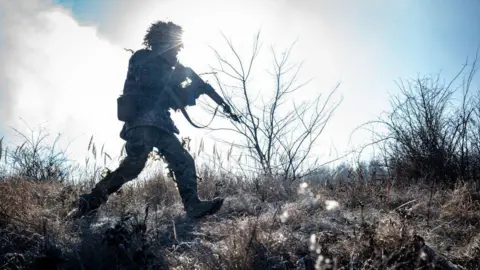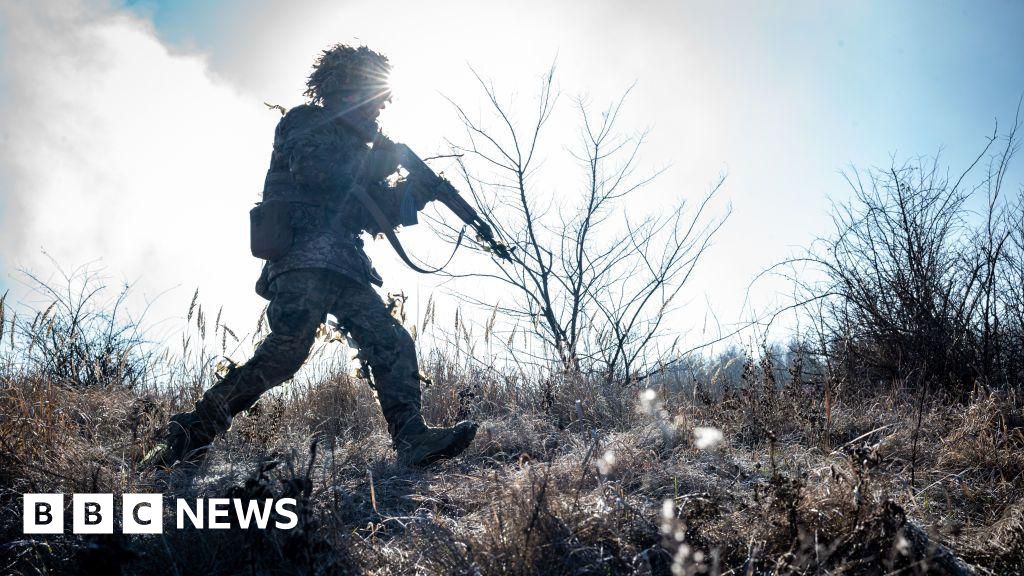
Getty Images
This week marks a significant moment in the ongoing conflict in Ukraine, with diplomatic talks unfolding in Paris and Riyadh. European leaders are convening in France amid rising concerns over former President Donald Trump’s recent proposal to initiate peace negotiations with President Vladimir Putin of Russia. Meanwhile, in Saudi Arabia, the Russian Foreign Minister and the U.S. Secretary of State are poised to meet, although Ukraine is conspicuously absent from both discussions. As the war enters its third year, the implications of these talks could dramatically shape Ukraine’s future.
| Article Subheadings |
|---|
| 1) European Leaders Meet in Paris |
| 2) Dynamics of German Support and Defense Spending |
| 3) Poland’s Argument Against Conceding to Russia |
| 4) The Nordic and Baltic Countries’ Concerns |
| 5) U.S. Negotiations: A Dual Approach |
European Leaders Meet in Paris
The backdrop of the European gathering in Paris is shaped by a growing unease regarding the U.S. position on the Ukraine conflict under Trump’s potential leadership. One notable participant is Sir Keir Starmer, leader of the UK Labour Party, who asserts his mission is to serve as a mediator between European leaders and the anticipated policies of Trump’s administration. His advocacy includes the proposal to increase UK defense commitments, potentially mobilizing troops within Ukraine to facilitate a peace settlement.
In recent years, UK leaders had maintained the narrative that any peace agreement must first meet Ukrainian approval. However, the political climate has shifted, with recent comments from U.S. officials suggesting that a return to the pre-war status of 2014 may no longer be tenable. Starmer aims to unify European nations to bolster their military presence, thereby reinforcing deterrence against Russian advances.
Dynamics of German Support and Defense Spending
Germany’s position in the ongoing discourse is critical, especially as the nation prepares for a national election amidst shifting political attitudes. Chancellor Olaf Scholz is participating in the Paris talks, representing a collective stance against U.S. proposals that risk compromising Ukraine’s sovereignty. Leaders across the political spectrum in Germany have signaled strong disapproval of any peace efforts that bypass Ukraine, aware that such actions could foster instability detrimental not only to Ukraine but also to German security in the long term.
Despite this unified front, there are growing domestic pressures related to defense budgets, as Germany has ramped up defense expenditures following its reductions in Russian energy reliance. Emerging budgetary conflicts have led to significant political instability, underscoring the importance of a careful approach in discussing Germany’s future military commitments regarding support for Ukraine.
Poland’s Argument Against Conceding to Russia
Poland has consistently positioned itself as one of the staunchest advocates for Ukraine since the onset of the conflict. With its logistical infrastructure supporting the delivery of military and humanitarian aid, Poland’s leaders, such as Prime Minister Donald Tusk, maintain that capitulating to Moscow’s demands could destabilize Europe as a whole. Poland views the situation through a lens of urgency, arguing that a lack of robust European military spending in response to growing threats will necessitate significantly higher costs in the event of an escalated conflict.
Tusk’s recent remarks about the necessity for substantial defense allocations, reflected in Poland’s military spending reaching nearly 5% of its GDP, demonstrate this commitment. However, despite the intense desire to assist Ukraine, Polish officials have been hesitant to publicly support sending troops into Ukraine, preferring to weigh the implications of such actions cautiously.
The Nordic and Baltic Countries’ Concerns
Denmark’s involvement in the talks in Paris aims to represent not only its national interests but also those of its Baltic neighbors—Estonia, Latvia, and Lithuania—all of whom share a border with Russia and feel particularly threatened by Putin’s aggressive posture. The notion of potential Russian expansionism resonates deeply in these nations, with a collective feeling that any concession to Russia could place their own security at risk.
Prime Minister Mette Frederiksen has strategically navigated the political landscape, raising awareness of military challenges in the context of Trump’s administration. Discussions have yet to lead to explicit commitments for ground troops, with Danish officials articulating that maintaining an observant stance is more pertinent than rash decisions. This indicates a broader hesitancy amongst Nordic nations regarding military engagements at this critical juncture.
U.S. Negotiations: A Dual Approach
The U.S. approach to negotiations reflects a duality underscoring the complexities involved in dealing with Russia. On one side, Secretary of State Marco Rubio and Special Envoy to the Middle East Steve Witkoff are representing the U.S. under Trump’s guidance. Despite the administration’s emphasis on a peaceful resolution, the overarching narrative seems to lean toward minimizing American presence in Ukraine while seeking proposals from Russian officials about territorial and military concessions.
Trump’s statements have stirred concerns among European allies, particularly regarding the potential normalization of Russian territorial gains. Although he acknowledges Ukraine’s role in eventual negotiations, these talks happening without Ukrainian representatives invite apprehension as to their outcomes. The negotiations in Saudi Arabia signify a starting point, opening dialogue about future interactions and possible compromises, albeit amidst significant uncertainty about where this will lead.
| No. | Key Points |
|---|---|
| 1 | European leaders convened in Paris to address the implications of U.S. negotiations with Russia. |
| 2 | Germany remains committed to supporting Ukraine but faces internal pressure related to defense spending. |
| 3 | Poland urges greater military expenditures among European nations to deter Russian aggression. |
| 4 | Nordic countries, led by Denmark, express caution regarding military commitments to Ukraine. |
| 5 | The U.S. seeks to broach negotiations with Russia while gauging potential compromises on territorial claims. |
Summary
The talks taking place in Paris and Riyadh represent a significant pivot in the international response to the ongoing war in Ukraine. The absence of Ukrainian representatives highlights the complexities of diplomatic negotiations that could potentially underpin future geopolitical realities in Europe. With rising tensions and varying stances among European nations, the outcome of these discussions could have far-reaching implications for the security dynamics across the continent, further underscoring the critical role that concerted international action plays in addressing the ongoing crisis.
Frequently Asked Questions
Question: What is the significance of the talks in Paris?
The talks in Paris represent a coordinated effort by European leaders to respond to shifting geopolitical dynamics under a potential new U.S. administration, particularly concerning ongoing negotiations with Russia regarding Ukraine.
Question: Why is Ukraine not participating in the recent talks?
Ukraine is notably absent from the talks, which raises concerns among its leaders, as they believe any agreements made without their participation will not adequately represent Ukrainian interests or sovereignty.
Question: What are the primary concerns of European leaders regarding the U.S. negotiations with Russia?
European leaders are concerned that U.S. negotiations with Russia may overlook Ukraine’s sovereignty, potentially allowing Russia to solidify its territorial gains and making concessions that would compromise the security of the entire region.



